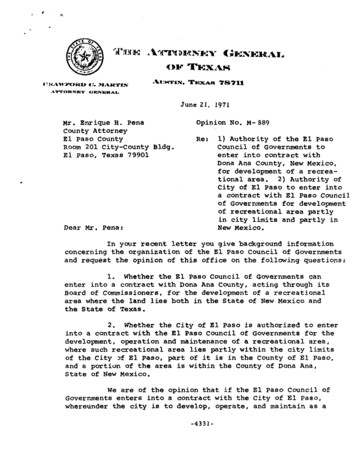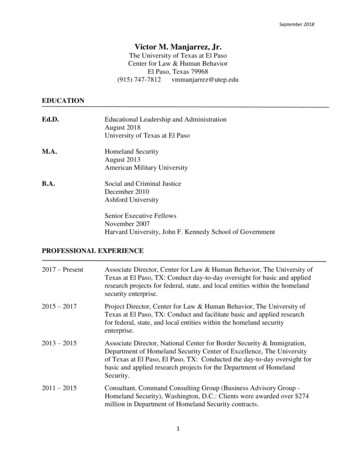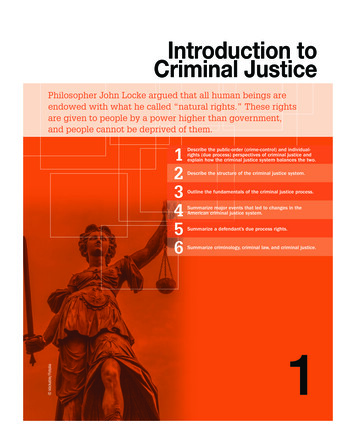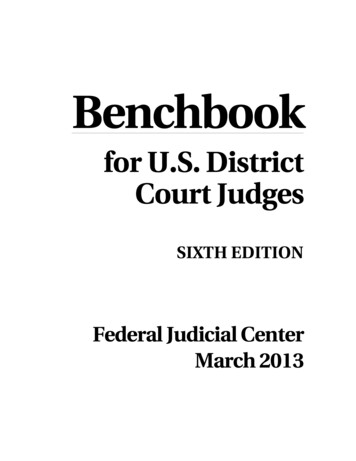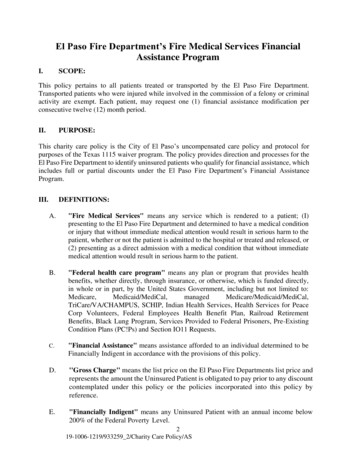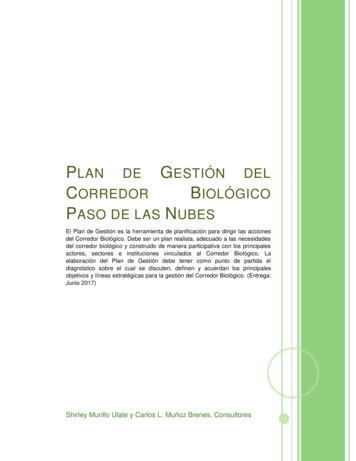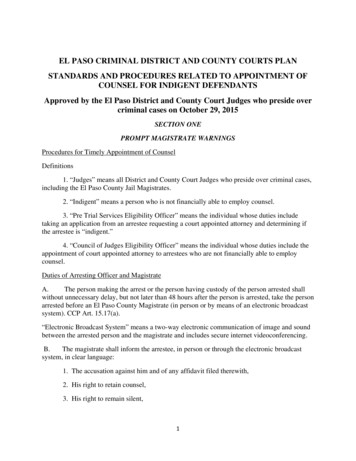
Transcription
EL PASO CRIMINAL DISTRICT AND COUNTY COURTS PLANSTANDARDS AND PROCEDURES RELATED TO APPOINTMENT OFCOUNSEL FOR INDIGENT DEFENDANTSApproved by the El Paso District and County Court Judges who preside overcriminal cases on October 29, 2015SECTION ONEPROMPT MAGISTRATE WARNINGSProcedures for Timely Appointment of CounselDefinitions1. “Judges” means all District and County Court Judges who preside over criminal cases,including the El Paso County Jail Magistrates.2. “Indigent” means a person who is not financially able to employ counsel.3. “Pre Trial Services Eligibility Officer” means the individual whose duties includetaking an application from an arrestee requesting a court appointed attorney and determining ifthe arrestee is “indigent.”4. “Council of Judges Eligibility Officer” means the individual whose duties include theappointment of court appointed attorney to arrestees who are not financially able to employcounsel.Duties of Arresting Officer and MagistrateA.The person making the arrest or the person having custody of the person arrested shallwithout unnecessary delay, but not later than 48 hours after the person is arrested, take the personarrested before an El Paso County Magistrate (in person or by means of an electronic broadcastsystem). CCP Art. 15.17(a).“Electronic Broadcast System” means a two-way electronic communication of image and soundbetween the arrested person and the magistrate and includes secure internet videoconferencing.B.The magistrate shall inform the arrestee, in person or through the electronic broadcastsystem, in clear language:1. The accusation against him and of any affidavit filed therewith,2. His right to retain counsel,3. His right to remain silent,1
4. His right to have an attorney present during any interview with peace officers orattorneys representing the state,5. His right to terminate the interview at any time, and6. His right to have an examining trial.7. Arrestee is not required to make a statement and that any statement made by him maybe used against him.8. If arrestee is not a United States Citizen, he has the right to contact the consulate of hisnative country.9. The magistrate shall inform the person arrested of the person’s right to request theappointment of counsel if the person cannot afford counsel.10. The magistrate shall inform the person arrested of the procedures for requestingcounsel.11. If the arrestee does not speak and understand the English language or is deaf, themagistrate shall inform the person through a qualified interpreter under CCP Art. 38.30 and38.31, as appropriate.12. The magistrate shall ensure that reasonable assistance in completing the necessaryforms for requesting appointment of counsel is provided to the person at the same time.C.The magistrate shall, without unnecessary delay, but not later than 24 hours after theperson requests appointment of counsel, transmit, or cause to be transmitted, to the court or thecourt’s designee authorized under CCP Art. 26.04 to appoint counsel in the county, the formsrequesting the appointment of counsel.D.A pre-trial services eligibility officer shall interview arrestees during the booking processand who remain in custody no later than 24 hours after the person requests appointment ofcounsel to determine whether defendant meets eligibility standards for appointment of counsel. Ifa determination of indigence is made, the Order Appointing Attorney will be signed by an ElPaso District Court Judge, El Paso Criminal District Court Judge, El Paso County Court at LawJudge, El Paso County Criminal Court at Law Judge, or an El Paso County Jail Magistrate. CCPArt. 26.04(b)(1).E.A recording of the communication between the person arrested and the magistrate shallbe made. The recording shall be preserved until the earlier of the following dates: (1) the date onwhich the pretrial hearing ends; or (2) the 91st day after the date on which the recording is madeif the person is charged with a misdemeanor or the 120th day after the date on which therecording is made if the person is charged with a felony. The counsel for the defendant mayobtain a copy of the recording on payment of a reasonable amount to cover costs of reproduction.F.In each case in which a person arrested is taken before a magistrate as required bySubsection A, a record (See Forms-Magistrate Warnings) shall be made of :2
1. The date and time the magistrate informed the person of the person’s right to requestappointment of counsel;2. The magistrate asking the person whether the person wants to request appointment ofcounsel; and3. Whether the person requested appointment of counsel. CCP Art. 15.17(e).G.A record required under CCP Art. 15.17 (e) may consist of written forms, electronicrecordings, or other documentation as authorized by procedures adopted in El Paso County.CCP Art. 15.17(f.).H.If the magistrate has reason to believe the accused is not mentally competent, themagistrate shall enter a request for counsel on behalf of the accused.I.Defendants who did not request an attorney at the time of the magistrate warnings butrequest one at a later time will be interviewed by a Pre Trial Services eligibility officer. As analternative, the Judge of the trial court or a Jail Magistrate may make the attorney appointment incourt under “interest of justice” criteria. If the appointment is made by the Judge of the trial courtor the Jail Magistrate in the interest of justice, the rationale for the appointment must be placedon the record. (See Form-Appointment of Attorney Out of Order).Release on Bond of Certain Persons Arrested Without a Warrant1. Misdemeanor-A person arrested without a warrant and who is detained in jail must bereleased on bond, in an amount not to exceed 5,000, not later than the 24th hour after theperson’s arrest if the person was arrested for a misdemeanor and a magistrate has not determinedwhether probable cause exists to believe that the person committed the offense. If the person isunable to obtain a surety for the bond or unable to deposit money in the amount of the bond, theperson must be released on personal bond. CCP Art. 17.033(a).2. Felony-A person arrested without a warrant and who is detained in jail must bereleased on bond, in an amount not to exceed 10,000, not later than the 48th hour after theperson’s arrest if the person was arrested for a felony and a magistrate has not determinedwhether probable cause exists to believe that the person committed the offense. If the person isunable to obtain a surety for the bond or unable to deposit money in the amount of the bond, theperson must be released on personal bond. CCP Art. 17.033(b).Out of County WarrantsThe person making the arrest or the person having custody of a person arrested on an outof-county warrant shall without unnecessary delay, but not later than 48 hours after the person isarrested, take the person arrested before an El Paso County Magistrate (in person or by means ofan electronic broadcast system). CCP Art. 15.18.For persons arrested on out-of-county warrants, the magistrate will ask the defendant ifhe/she would like to request appointed counsel. The magistrate will record the response, and ifcounsel is requested, the magistrate will provide the arrestee with the appropriate forms (theindigence affidavit from the County issuing the warrant) for requesting counsel. The magistrate3
will ensure assistance in completing the forms at the same time. The forms will be transmitted bya Pre-trial Eligibility Officer to the appointing authority in the county issuing the warrant within24 hours of the request being made. Regarding the appointment of counsel, persons arrested inother counties on local warrants must be appointed counsel in a county that issued the warrantwithin 1 working day of receipt of the request in counties with a population of 250,000 or moreand within 3 working days of receipt of the request in counties under 250,000. Persons arrestedon out-of-county warrants must be appointed counsel in the county of arrest if the person has notbeen transferred or released to the custody of the county issuing the warrant before the 11th dayafter the date of the arrest. CCP Art. 1.051(c-1).If an indigent defendant is arrested in another county based on an El Paso Countywarrant, counsel will be appointed within one working day of this county’s receipt of the requestfor counsel. The completed indigence affidavit will be emailed to the Council of Judges.If a defendant is arrested in this county based on another county’s warrant, counsel willbe appointed pursuant to chapter 11 or chapter 17 of the Texas Code of Criminal Procedure, if onthe eleventh day after the arrest, the defendant is still in this county’s custody.SECTION TWOINDIGENCE DETERMINATION STANDARDSA.Definitions, as used in this section:1. “Indigent” means a person who is not financially able to employ counsel. CCP Art.1.051(b).2. “Defendant’s adjusted gross income” means all income of the accused and spousalincome actually available to the accused. Such income shall include: take-home wages and salary(gross income earned minus those deductions required by law or as a condition of employment);net self-employment income (gross income minus business expenses, and those deductionsrequired by law or as a condition of operating the business); regular payments from agovernmental income maintenance program, alimony, child support, public or private pensions,or annuities; and income from dividends, interest, rents, royalties, regular payments from SocialSecurity, veteran’s benefits, unemployment compensation, money or periodic receipts fromestates or trusts. Seasonal or temporary income shall be considered on an annualized basis,averaged together with periods in which the accused has no income or lesser income.3. “Household” means all individuals who are actually dependant on the accused forfinancial support.4. “Net Household income” is the Defendant’s necessary expenses will be subtractedfrom the Defendant’s and spouse’s adjusted gross income. The resulting number will be referredto as the defendant’s “net household income.”5. “Necessary expenses” should include but are not limited to: rent or mortgage,food/groceries, a single car payment, utilities, unusual medical bills, child support, and alimony.4
4. “The cost of obtaining competent private legal representation” includes the reasonablecost of support services such as investigators and expert witnesses as necessary and appropriategiven the nature of the case.B.After the 15.17 hearing, if the arrested person has informed the magistrate that she/hewants to request court appointed counsel, the arrested person will be interviewed by a Pre TrialServices eligibility officer whether or not they are able to make bond. If the defendant makesbond, this interview will take place before release on bond, if possible. If the defendant postsbond or is released on a PR bond before an indigence affidavit was completed, instructions willbe given upon release from the jail to complete the affidavit at 500 E. San Antonio, Rm. LL117,El Paso, Texas 79901.C.As soon as possible following the article 15.17 hearing, a Pre Trial Services eligibilityofficer shall interview each arrested person who wants to request appointment of counsel, andthe arrested person will provide under oath the necessary information including supportingdocumentation (if not in custody) concerning the person’s financial resources. They shall inputthis information onto an affidavit (See Forms: El Paso District and County Court Application forAppointed Attorney) for the arrested person. The indigence affidavit shall be transmitted to theOffice of the Council of Judges no later than 24 hours after the arrestee appeared before themagistrate.D.A defendant is considered indigent if any of the following conditions or factors arepresent:1. At the time of the application, the defendant, spouse or children residing with thedefendant are eligible to receive Food Stamps, Medicaid, Temporary Assistance for NeedyFamilies, Supplemental Security Income, or Public Housing;2. The defendant’s net household income does not exceed 100% of the federal HHSpoverty guidelines as revised annually by the United States Department Of Health and HumanServices and published in the Federal Register and the defendant does not have nonexempt assetsgreater than 2500, or3. The defendant is currently serving a sentence in a correctional institution, is currentlyresiding in a public mental health facility, or is subject to a proceeding in which admission orcommitment to such a mental facility is sought.E.In determining whether a defendant is indigent who does not qualify under D (1), (2),(3)the court or court’s designee may consider the defendant’s income, source of income, assets,property owned, outstanding obligations, necessary expenses, the number and ages ofdependants, and spousal income that is available to the defendant. If this analysis of nethousehold income results in an amount less than the amount stated in the poverty guidelines forthe applicable household size, the defendant will be considered indigent. The court or court’sdesignee may not consider whether the defendant has posted or is capable of posting bail, exceptto the extent that it reflects the defendant’s financial circumstances as measured by theconsiderations listed in this subsection. CCP Art. 26.04 (m).F.The procedures and standards for determining a defendant’s indigence shall apply to eachdefendant in the county equally, regardless of whether the defendant is in custody or has been5
released on bail. The procedures and standards for determining whether a defendant is indigentshall apply to misdemeanors and felonies. CCP Art. 26.04(l).G.A defendant who requests a determination of indigent and appointment of counsel shall:1. Complete under oath a questionnaire concerning his financial resources;2. Respond under oath to an examination regarding his financial resources by the judge ormagistrate responsible for determining whether the defendant is indigent; or3. Complete the questionnaire and respond to examination by the judge or magistrate.CCP Art. 26.04(n).H.Before making a determination of whether a defendant is indigent, the court shall requestthe defendant to sign under oath before a Pretrial Services Eligibility Officer, a Clerk, or a Judgea statement substantially in the following form:“On this day of , 20 , I have been advised by the (name ofthe court) Court of my right to representation by counsel in connection with the chargepending against me. I am without means to employ counsel of my own choosing and Ihereby request the court to appoint counsel for me. (signature of the defendant)” CCPArt. 26.04(o).I.A written or oral statement elicited under this article or evidence derived from thestatement may not be used for any purpose, except to determine the defendant’s indigent statusor to impeach the direct testimony of the defendant. The defendant may be prosecuted underTexas Penal Code, Chapter 37. CCP Art. 26.04 (q).J.A request by the appointing authority for additional information, documentation, and/orverification cannot delay appointment of counsel beyond the timelines specified in the Code ofCriminal Procedure and this Indigent Defense Plan.K.A court may not threaten to arrest or incarcerate a person solely because the personrequests the assistance of counsel. CCP Art. 26.04 (r).L.A defendant that does not meet any of the standards above shall nonetheless beconsidered indigent if the accused is unable to retain private counsel without substantial hardshipto the accused or the defendant’s dependents. In considering if obtaining private counsel willcreate a substantial hardship, the magistrate or judge authority shall take into account; (1) thenature of the criminal charge(s); (2) anticipated complexity of the defense; (3) the estimated costof obtaining competent private legal representation for the matter(s) charged; (4) the amountneeded for the support of the accused and the defendant’s dependents; (5) defendant’s income;(6) source of income; (7) assets and property owned; (8) outstanding obligations; (9) unusual,excessive or extraordinary medical expenses; (10) necessary expenses; (11) age or physicalinfirmity of household members; (11) the number and ages of dependents; and (12) spousalincome that is available to the accused.6
M.After the 15.17 hearing, if the arrested person has informed the magistrate that he doesnot want to request court appointed counsel, this will be reflected on the Magistrate WarningForm. If at any time after the arrested person is given his magistrate warnings he decides that hewould like to be interviewed after declining court appointed counsel, he will be referred to a PreTrial Services eligibility officer for an interview. If at any time after the Magistrate administersthe 15.17 warnings, the arrested person decides that he does not want to be interviewed for courtappointed counsel, after making the request with the magistrate, he will be referred to a Pre TrialServices eligibility officer to sign a form reflecting a waiver. (See Forms-Waiver of Counsel).N.An unrepresented non indigent felony defendant remaining in custody for 14 days shallhave his status changed to indigent and an attorney shall be appointed by the COJ. Anunrepresented non indigent misdemeanor defendant remaining in custody for 7 days shall havehis status changed to indigent and an attorney shall be appointed by the COJ.O.A defendant who is determined by the court to be indigent is presumed to remain indigentfor the remainder of the proceedings in the case unless a material change in the defendant’sfinancial circumstances occurs. If there is a material change in financial circumstances after adetermination of indigence or non indigence is made, the defendant, the defendant’s counsel, orthe attorney representing the state may move for reconsideration of the determination. CCP Art.26.04 (p).P.The presumption can be rebutted in the review proceedings based on the following:1. Evidence of a material change in the accused’s financial circumstances, as a result ofwhich the accused does not meet any of the standards for indigence contained in these rules; or2. Additional information regarding the accused’s financial circumstances that show thatthe accused does not meet any of the standards of indigence contained in these rules.Q.If an accused previously determined to be indigent is subsequently determined not to beindigent, the attorney shall be compensated according to the fee schedule for hours reasonablyexpended on the case.R.If the court determines that a defendant has financial resources that enable him to offsetin part or in whole the costs of the legal services provided, including any expenses and costs, thecourt shall order the defendant to pay, if convicted, as court costs the amount that it finds thedefendant is able to pay. The finding shall include additional evidence prior to imposition ofsentence that justifies a finding that the defendant can repay part or in whole the costs. An ordersupporting such finding shall be entered. CCP Art. 26.05(g).S.Each Trial Court in which the case is filed (transferred or assigned) shall conduct ahearing after due notice on all re-evaluations of indigent and/or material change of financialcircumstances according to the law so as not to interfere with established attorney-clientrelationship.7
SECTION THREEPROMPT APPOINTMENT OF COUNSELA.Counsel shall be appointed as soon as possible to indigent defendants, but no later than theend of the first working day after the date on which the appointing authority receives thedefendant’s request for court appointed counsel. Working day means Monday through Friday,excluding El Paso County holidays. Counsel must be appointed whether or not a case has beenfiled in the trial court. CCP Art. 1.051(c).B.If the defendant is released from custody prior to the appointment of counsel,appointment of counsel is not required until the defendant’s first court appearance or whenadversarial judicial proceedings are initiated, whichever comes first. CCP Art. 1.051(j).If a defendant wishes to request counsel prior to the initial appearance, the forms requiredto request counsel may be obtained at the Texas Indigent Defense Commission’s website athttp://tidc.tamu.edu/public.net/ or from the Pre Trial Services Department, 500 E. San Antonio,Rm. LL117, El Paso, Texas 79901. The defendant may submit these completed forms to the PreTrial Services Department. The court will rule on all requests for counsel submitted in thismanner. 1 TAC 174.51Appointment AuthorityIf a misdemeanor case or felony case is UNFILED, the appointing authority is: Office ofthe Council of Judges.If the case has been FILED in a trial court, the appointing authority is: Office of theCouncil of Judges or the Trial Court.A.Pre Trial Services will receive a list every morning containing the names of alldefendants who were arrested the previous day and wish to apply for a court appointed attorney.Eligibility Officers will interview these defendants and take an application to determine if thedefendant qualifies for a court appointed attorney. If the defendant qualifies, an attorney shall beappointed for all his/her cases, regardless of whether the cases have been filed or not.B.Appointments for Motions to Revoke Probation, and Motions to Adjudicate Guilt will bemade from a rotational list of qualified attorneys in the same manner as any other misdemeanoror felony case, depending on the classification of the offense.C.At any time, a defendant may appear before the trial judge or a jail magistrate and requesta court appointed attorney, and the trial judge or jail magistrate has the discretion to appoint anattorney to represent the defendant. The attorney must be qualified to take that degree of offense,and may be chosen from the next five names on the wheel in the order in which the attorney’sname appears on the list, or a request can be made for the system to make an automaticappointment. The judge shall make a finding of good cause on the record if appointing an8
attorney out of order, and may appoint any qualified, willing attorney regardless of whether theattorney’s name is among the next five names on the appropriate list.D.Before withdrawing as counsel for the defendant after trial or the entry of a plea of guilty,the appointed trial attorney shall advise the defendant of the defendant’s right to file a motion fornew trial and a notice of appeal. If the defendant wishes to pursue either or both of theseremedies, the appointed trial attorney must assist the defendant in requesting the promptappointment of replacement counsel, and if replacement counsel is not appointed promptly andthe defendant wishes to pursue an appeal, file a timely notice of appeal.E.Once these steps have been completed, the court appointed trial attorney’s representationof the defendant is concluded. No motion to withdraw is necessary. The trial court may thenappoint a qualified attorney from the Appellate list. The trial court may appoint a lawyer fromthe next five names on the appropriate Appellate list in the order in which the attorney’s nameappears on the list, or a request can be made for the system to make an automatic appointment.The judge shall make a finding of good cause on the record if appointing an attorney out oforder, and may appoint any qualified, willing attorney regardless of whether the attorney’s nameis among the next five names on the appropriate list.DIMS Jail Pleas1. An “Attorney of the Day” will be appointed at the Jail Magistrate for all the indigentdefendants at the DIMS jail pleas. This attorney will represent the defendant until charges aredismissed, the defendant is acquitted, appeals are exhausted, or the attorney is permitted to orordered by the court to withdraw as counsel for the defendant after a finding of good cause isentered on the record. “Attorney of the Day” attorneys will be rotated from the Class A&BMisdemeanor/State Jail Felony wheel list and will be on a voluntary basis. If an attorney doesnot wish to be the “Attorney of the Day”, they will not be taken off the wheel.2. If a defendant already has a court appointed attorney on a prior case, the same attorneywill be appointed in order to avoid the appointment of multiple attorneys. If this occurs, the priorcourt appointed attorney will be appointed to this case and notified of the new case.Defendants Appearing Without Counsel1. If a defendant who has refused appointed counsel in order to retain private counselappears without counsel after having been given an opportunity to retain counsel, the court, aftergiving the defendant a reasonable opportunity to request appointment of counsel or, if thedefendant elects not to request appointment of counsel, after obtaining a waiver of the right tocounsel pursuant to CCP Art. 1.051(f) (g) may proceed with the matter on 10 days notice to thedefendant of a dispositive setting. CCP Art. 1.051(e).2. The court may not direct or encourage the defendant to communicate with the attorneyrepresenting the state until the court advises the defendant of the right to counsel and the9
procedure for requesting appointed counsel and the defendant has been given a reasonableopportunity to request appointed counsel. CCP Art. 1.051(f-2).3. If the defendant has requested appointed counsel, the court may not direct or encouragethe defendant to communicate with the attorney representing the state unless the appointingauthority has denied the request and, subsequent to the denial, the defendant:a. Has been given a reasonable opportunity to retain and has failed to retainappointed counsel; orb. Waived or has waived the opportunity to retain private counsel. CCP Art.1.051(f-2).A.The attorney representing the state may not:1. Initiate or encourage an attempt to obtain from the defendant a waiver of the right tocounsel; or2. Communicate with a defendant who has requested the appointment of counsel, unlessthe appointing authority has denied the request and subsequent to the denial, the defendant:a. Has been given a reasonable opportunity to retain counsel; orb.Waives or has waived the opportunity to retain private counsel. CCP Art.1.051(f-1).B.Waiver of the Right to Counsel1. A defendant may voluntarily and intelligently waive the right to counsel.2. A waiver obtained in violation of CCP Art. 1.051(f-1) or (f-2) is presumed invalid.C.If a defendant wishes to waive the right to counsel for purposes of entering a guilty pleaor proceeding to trial, the court shall advise the defendant of the nature of the charges against thedefendant and, if the defendant is proceeding to trial, the dangers and disadvantages of selfrepresentation. If the court determines that the waiver is voluntarily and intelligently waived, thecourt shall provide the defendant with a statement substantially in the following form, which, ifsigned by the defendant, shall be filed with and become part of the record of the proceedings.“I have been advised this day of , 2 , by the (name of court) Court of my rightto representation by counsel in the case pending against me. I have been further advised that if Iam unable to afford counsel, one will be appointed for me free of charge. Understanding myright to have counsel appointed for me free of charge if I am not financially able to employcounsel, I wish to waive that right and request the court to proceed with my case without anattorney being appointed for me. I hereby waive my right to counsel. (signature of defendant)”CCP Art. 1.051(g).10
D.A defendant may withdraw a waiver of the right to counsel at any time, but is not entitledto repeat a proceeding previously held or waived solely on the grounds of the subsequentappointment or retention of counsel. If the defendant withdraws a waiver, the trial court, in itsdiscretion, may provide the appointed counsel 10 days to prepare. CCP Art. 1.051(h).E.The court or the courts’ designee may, without unnecessary delay, appoint new counselto represent an indigent defendant for whom counsel is appointed if:1. The defendant is subsequently charged in the case with an offense different from theoffense with which the defendant was initially charged; and2. Good cause to appoint new counsel is stated on the record as required by CCP Art.26.04(j) (2) [CCP Art. 1.051(k)].F.An attorney appointed to a case that does not appear, or notify the court by 9:30 a.m. thefollowing morning will be removed from the case and go back to the bottom of the list.Excessive tardiness or failures to appear may result in removal from the case and the wheel if itimpedes the administration of justice.G.A trial court may appoint any available, qualified attorney to advise a witness when thelaw requires representation.SECTION FOURATTORNEY SELECTION PROCESSA.Whenever a court or the courts’ designee authorized to appoint counsel for indigentdefendants in the county determines, for the purpose of a criminal proceeding that a defendantcharged with or appealing a conviction of a felony or a misdemeanor punishable by confinementis indigent or if the interests of justice require representation of a defendant in a proceeding, thecourt or the courts’ designee shall appoint one or more practicing attorneys to represent thedefendant in accordance with the El Paso County Indigent Plan. CCP Art. 26.04(c).B.The Office of the Council of Judges or the Trial Court will identify which of theappointment wheels, discussed in Section V (attorney qualifications), is the most appropriatebased on the accusations against the defendant and will appoint an attorney from a publicappointment list, which includes the El Paso Public Defender’s Office, using a system ofrotation. The court shall appoint attorneys from among the next five names on the appointmentlist in the order in which the attorneys’ names appear
including the El Paso County Jail Magistrates. 2. "Indigent" means a person who is not financially able to employ counsel. 3. "Pre Trial Services Eligibility Officer" means the individual whose duties include taking an application from an arrestee requesting a court appointed attorney and determining if the arrestee is "indigent." 4.

